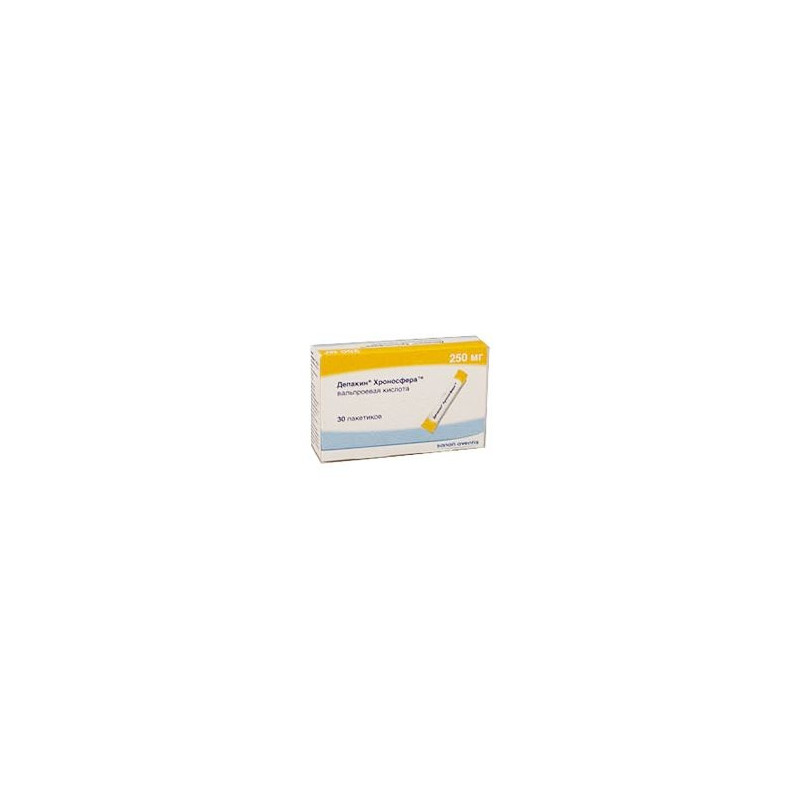



 All payments are encrypted via SSL
All payments are encrypted via SSL
 Full Refund if you haven't received your order
Full Refund if you haven't received your order
Indications
In adults: as monotherapy or in combination with other antiepileptic drugs in the following conditions:
treatment of generalized epileptic seizures (clonic, tonic, tonic-clonic, absences, myoconic, atonic, Lennox-Gastaut syndrome);
treatment of partial epileptic seizures (partial seizures with or without secondary generalization);
treatment and prevention of bipolar affective disorders.
In infants (from the 6th month of life) and children: as monotherapy or in combination with other antiepileptic drugs in the following conditions:
treatment of generalized epileptic seizures (clonic, tonic, tonic-clonic, absences, myoconic, atonic, Lennox-Gastaut syndrome);
treatment of partial epileptic seizures (partial seizures with or without secondary generalization);
prevention of seizures at high temperature, when such prevention is necessary.
Contraindications
hypersensitivity to valproate or to any of the components of Depakene Chronosphere;
acute hepatitis;
chronic hepatitis;
cases of severe hepatitis in a patient or in his family history, especially caused by drugs,as well as severe violations of the liver or pancreas;
porphyria;
hemorrhagic diathesis, thrombocytopenia;
combination with mefloquine;
combination with hunter;
this drug is not recommended for use in combination with lamotrigine;
children up to 6 months.
Carefully:
a history of liver and pancreas diseases;
pregnancy;
congenital fermentopathies;
oppression of bone marrow hematopoiesis (leukopenia, thrombocytopenia, anemia);
renal failure;
hypoproteinemia.
Side effects
From the side of the central nervous system: ataxia (from ≥0.1 to <1%); cases of cognitive impairment with a progressive onset (giving a complete picture of dementia syndrome), reversible within a few weeks or months after discontinuation of the drug (≤0.01%); states of confusion or convulsions: in several cases of treatment with valproatom, stupor or lethargy is described, sometimes leading to transient coma (encephalopathy); these cases were isolated or associated with a paradoxical increase in the frequency of convulsions during therapy, their frequency decreased when the treatment process was suspended or the dose was reduced. Most often, such cases are described with complex treatment (especially with phenobarbital) or after a sharp increase in the dose of valproate; isolated cases of reversible parkinsonism; headache, mild postural tremor and drowsiness.
On the part of the digestive system: some patients at the beginning of treatment often develop gastrointestinal disorders (nausea, vomiting, gastralgia, diarrhea),but they usually pass without withdrawing drug therapy within a few days; cases of pancreatitis, sometimes fatal (<0.01%), requiring early discontinuation of treatment; abnormal liver function (from ≥0.01 to <0.1%).
From the side of blood-forming organs: frequently occurring dose-dependent thrombocytopenia; inhibition of bone marrow hematopoiesis (from ≥0.01 to <0.1%), including anemia, leukopenia or pancytopenia.
On the part of the urinary system: enuresis (<0.01%), isolated cases of reversible Fanconi syndrome (genesis is not clear).
Allergic reactions: skin rash, urticaria, vasculitis. In some cases (<0.01%), toxic epidermal necrolysis, Stevens-Johnson syndrome, and erythema multiforme were described.
Laboratory indicators: isolated and moderate hyperaemonemia often occurs without changes in the analysis of liver function, especially with polytherapy. Cancellation of the drug in this case is not required. However, hyperammonemia associated with neurological symptoms is also described. This condition requires further examination. Perhaps an increase in liver transaminases. Individual cases of a decrease in fibrinogen level or an increase in bleeding time are described, usually without associated clinical manifestations and especially at high doses (sodium valproate has an inhibitory effect on the second stage of platelet aggregation). Hyponatremia (<0.01%)
Other: teratogenic risk; hair loss,rare reports of hearing loss (from ≥0.01 to <0.1%) both reversible and irreversible, very rare cases of mild peripheral edema (<0.01%), weight gain (since weight gain is a risk factor polycystic ovary syndrome, careful monitoring of such patients is recommended); there are also reports of gynecomastia, amenorrhea, irregular menstrual cycle.
Dosage and administration
Inside
Depakine® Chronosphere ™ 100 mg bags are used only in children and infants.
Depakine® Chronosphere ™ 1000 mg bags are used only in adults.
The daily dose is recommended to be taken in one or two doses, preferably during a meal.
Use at one time is possible with well controlled epilepsy.
Depakine® Chronosphere ™ should be poured onto the surface of soft food or drink, cold or at room temperature (yogurt, orange juice, fruit puree, etc.).
Depakine® Chronosphere ™ cannot be used with hot food or beverages (such as soups, coffee, tea, etc.).
Depakine® Chronosphere ™ cannot be poured into a bottle with a nipple, because pellets can clog the nipple hole.
If Depakine® Chronosphere ™ is taken with a liquid, it is recommended to rinse the glass with a small amount of water and drink this water, as the granules may stick to the glass.
The mixture should always be swallowed without chewing. It should not be saved for later intake.
Storage conditions
In the dark place at a temperature of no higher than 25 ° C.
